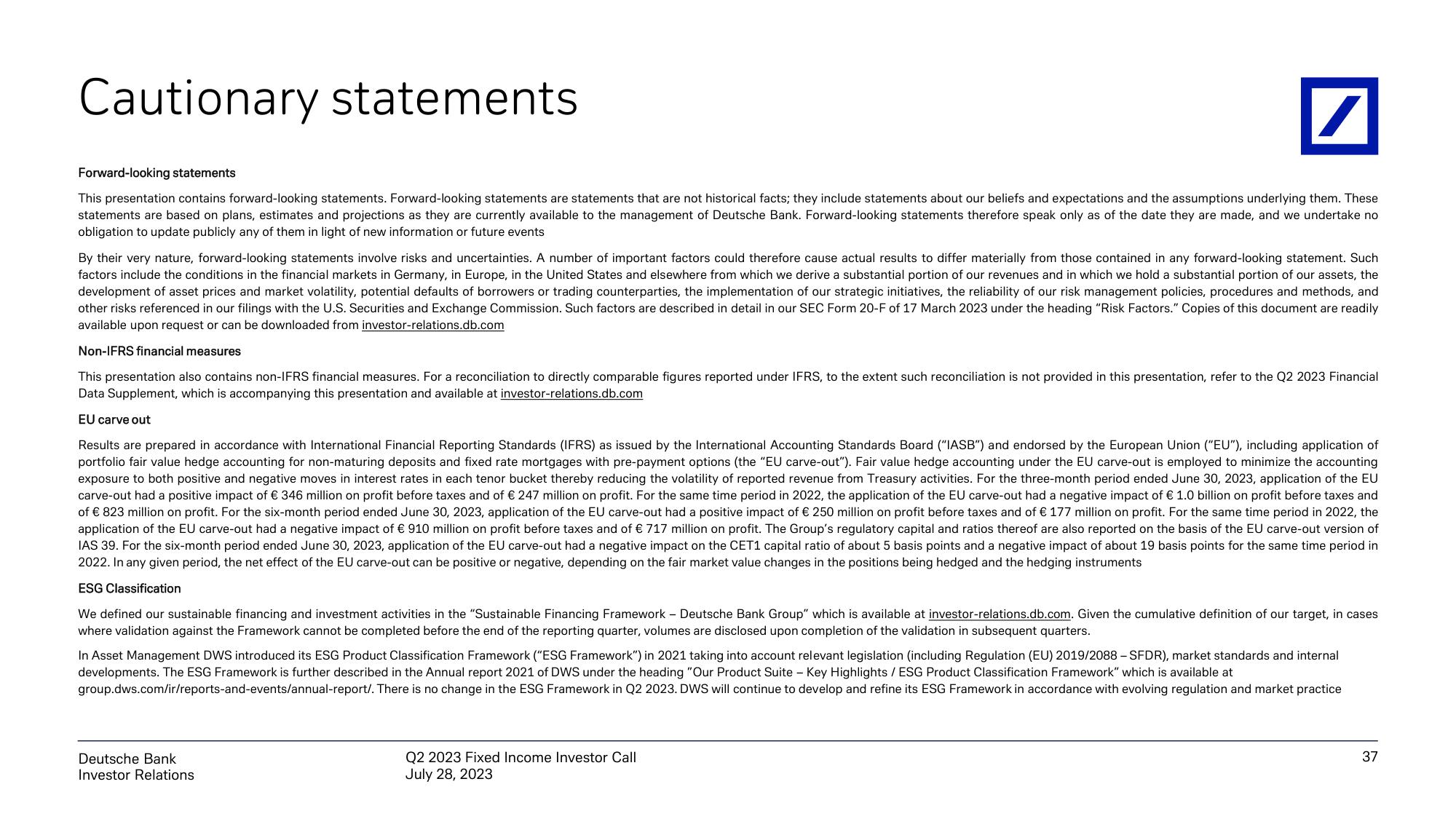Deutsche Bank Fixed Income Presentation Deck
Cautionary statements
Forward-looking statements
This presentation contains forward-looking statements. Forward-looking statements are statements that are not historical facts; they include statements about our beliefs and expectations and the assumptions underlying them. These
statements are based on plans, estimates and projections as they are currently available to the management of Deutsche Bank. Forward-looking statements therefore speak only as of the date they are made, and we undertake no
obligation to update publicly any of them in light of new information or future events
By their very nature, forward-looking statements involve risks and uncertainties. A number of important factors could therefore cause actual results to differ materially from those contained in any forward-looking statement. Such
factors include the conditions in the financial markets in Germany, in Europe, in the United States and elsewhere from which we derive a substantial portion of our revenues and in which we hold a substantial portion of our assets, the
development of asset prices and market volatility, potential defaults of borrowers or trading counterparties, the implementation of our strategic initiatives, the reliability of our risk management policies, procedures and methods, and
other risks referenced in our filings with the U.S. Securities and Exchange Commission. Such factors are described in detail in our SEC Form 20-F of 17 March 2023 under the heading "Risk Factors." Copies of this document are readily
available upon request or can be downloaded from investor-relations.db.com
Non-IFRS financial measures
This presentation also contains non-IFRS financial measures. For a reconciliation to directly comparable figures reported under IFRS, to the extent such reconciliation is not provided in this presentation, refer to the Q2 2023 Financial
Data Supplement, which is accompanying this presentation and available at investor-relations.db.com
EU carve out
Results are prepared in accordance with International Financial Reporting Standards (IFRS) as issued by the International Accounting Standards Board ("IASB") and endorsed by the European Union ("EU"), including application of
portfolio fair value hedge accounting for non-maturing deposits and fixed rate mortgages with pre-payment options (the "EU carve-out"). Fair value hedge accounting under the EU carve-out is employed to minimize the accounting
exposure to both positive and negative moves in interest rates in each tenor bucket thereby reducing the volatility of reported revenue from Treasury activities. For the three-month period ended June 30, 2023, application of the EU
carve-out had a positive impact of € 346 million on profit before taxes and of € 247 million on profit. For the same time period in 2022, the application of the EU carve-out had a negative impact of € 1.0 billion on profit before taxes and
of € 823 million on profit. For the six-month period ended June 30, 2023, application of the EU carve-out had a positive impact of € 250 million on profit before taxes and of € 177 million on profit. For the same time period in 2022, the
application of the EU carve-out had a negative impact of € 910 million on profit before taxes and of € 717 million on profit. The Group's regulatory capital and ratios thereof are also reported on the basis of the EU carve-out version of
IAS 39. For the six-month period ended June 30, 2023, application of the EU carve-out had a negative impact on the CET1 capital ratio of about 5 basis points and a negative impact of about 19 basis points for the same time period in
2022. In any given period, the net effect of the EU carve-out can be positive or negative, depending on the fair market value changes in the positions being hedged and the hedging instruments
ESG Classification
We defined our sustainable financing and investment activities in the "Sustainable Financing Framework - Deutsche Bank Group" which is available at investor-relations.db.com. Given the cumulative definition of our target, in cases
where validation against the Framework cannot be completed before the end of the reporting quarter, volumes are disclosed upon completion of the validation in subsequent quarters.
In Asset Management DWS introduced its ESG Product Classification Framework ("ESG Framework") in 2021 taking into account relevant legislation (including Regulation (EU) 2019/2088 - SFDR), market standards and internal
developments. The ESG Framework is further described in the Annual report 2021 of DWS under the heading "Our Product Suite - Key Highlights / ESG Product Classification Framework" which is available at
group.dws.com/ir/reports-and-events/annual-report/. There is no change in the ESG Framework in Q2 2023. DWS will continue to develop and refine its ESG Framework in accordance with evolving regulation and market practice
Deutsche Bank
Investor Relations
Q2 2023 Fixed Income Investor Call
July 28, 2023
37View entire presentation